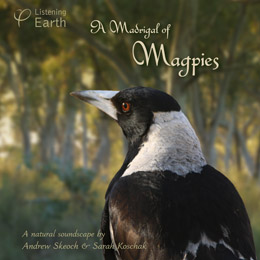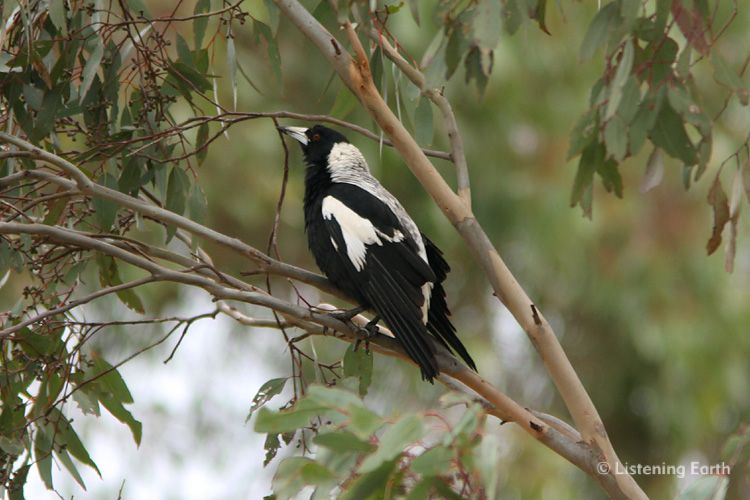

Running Time:
65 min
Release Date:
February 2009
Recording Location:
1. Capertee Valley, NSW

2. Near MacDonnell's Peak, outback South Australia
3. Yarra Valley, near Melbourne, Victoria

4. Baringup, central Victoria
If you like this album,
we also recommend:
A Madrigal of Magpies
The Australian Magpie has - for many - one of the most beautiful voices to be heard in the Aussie bush. If there were a collective term for a family of magpies warbling and carolling together, a madrigal (a traditional, multi-part, vocal song) would be most appropriate.
Magpies are highly intelligent and evolved songbirds with rich social relationships. Vocalisations are a big part of how they negotiate their lives, and their songs are highly fluid and quite individual. The complex sonic elements they contain convey nuanced information to other family members close by, and simultaneously advertise their presence to neighbours who may be some way distant.
This album begins with Magpies singing pleasantly among a symphony of spring morning birdsong. Then we travel to the outback, where Magpies are frequently heard singing quietly, as if to themselves, in the depths of night and into the pre-dawn. It is a quite beautiful and soothing sound.
Next, suburban Magpies call sweetly, along with Bellbirds and Rosellas, and then a family of Magpies are heard singing across a more rural landscape. We conclude with an additional track on this expanded edition; a dawn chorus of West Australian Magpies, which are a separate race with their own subtly unique repertoire.
This recording is a celebration of Magpie song - A madrigal of Magpies indeed.
Audio sample of this album
|
1. |
Bushland with Magpies |
25.27 |
|
2. |
Pre-dawn Magpie Carolling in the Outback |
13.10 |
|
3. |
Suburban Magpies |
5.40 |
|
4. |
Open Country Madrigals |
19.53 |
A Madrigal of Magpies
This audio sample features three excerpts from album tracks. The first minute or so is from a morning in bushland, and you can hear the Magpies’ typical daytime call, including some nice warb...
Read more >Purchase this
album as:
Digital Album
(for immediate download)
Download this album
for as little as
$7.50 -
View Special Deals
CD
+
Free mp3 format
(Prices AU$, exGST)
Mp3:
Mp3 is a universal audio format, playable on iPods, computers, media players and mobile phones.
Mp3 is a compressed format, allowing smaller filesizes, offering faster download times and requiring less storage space on players, but at some expense to the audio quality. Many listeners can't really hear the difference between mp3 and full CD-quality audio, and hence its convenience has lead to it becoming the default option for audio.
Our albums are generally encoded at around 256kbps (sometimes with VBR), balancing optimal audio quality without blowing out filesizes excessively. We encode using the Fraunhoffer algorithm, which preserves more detail in the human audible range than the lame encoder.
Our mp3 files are free of any DRM (digital rights management), so you can transfer them to any of your media technology. You've paid for them, they're yours for your personal use without restriction.
Mp3 files can be burned to disc, either as an mp3 disc, or an audio CD after converting them to a standard audio (.wav or .aif) format first.
FLAC:
FLAC is a high-quality audio format, allowing CD-resolution audio. It is ideal if you wish to burn your files to a CDR, or listen over a high resolution audio system. However files usually require special decoding by the user before playing or burning to disc.
FLAC (Free Lossless Audio Codec) is a LOSSLESS compressed audio format. This means that it preserves the full audio quality of a CD, but optimises the filesize for downloading. Typically, file sizes of around 60% are achieved without any degradation or loss of audio quality from the source files at the CD standard of 16bit/44.1kHz.
Obviously the file sizes are larger than for the mp3 version - usually around 300-400Mb for an album, compared to 100Mb for an mp3 album.
In addition, you'll need to know what to do with the files once you've downloaded them. In most cases you'll want to decode the files to wav or aiff, either to import into programs like iTunes, or burn to CDR. Some programs will play flac files natively.
There is a lot of information about flac online (eg: http://flac.sourceforge.net/)




 Alternate audio link
Alternate audio link 